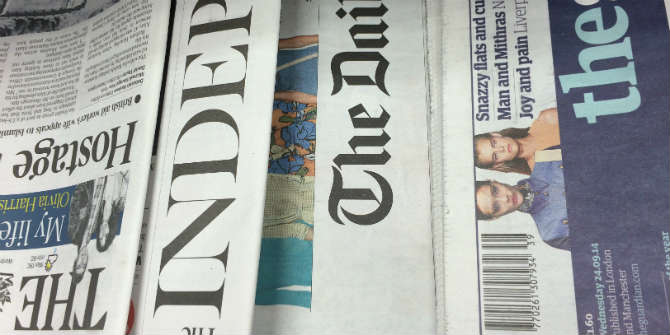 The Oxford Internet Institute’s Monica Bulger shares the findings from a new report on media literacy policy and research in Europe and explains that the increasing importance of media literacy in today’s world is an opportunity as well as an obstacle.
The Oxford Internet Institute’s Monica Bulger shares the findings from a new report on media literacy policy and research in Europe and explains that the increasing importance of media literacy in today’s world is an opportunity as well as an obstacle.
The recent Twitter and Internet hoaxes highlight the importance of critically approaching media messages, especially as indicators of information quality and veracity are ever more limited. Despite its importance in everyday life, efforts to promote media literacy suffer from lack of a commonly shared definition and coherent agenda.
Part of the problem, ironically, is messaging. For the past few years, media literacy initiatives have been part of the risk and safety agenda, while a broader, more positive view of its contributions to everyday well-being could motivate a wider array of experts and others to participate in promoting a media literacy agenda. Since the media environment structures people’s lives, we should think bigger, seeing media literacy on the same fundamental level as reading and writing and calculating.
In a new report Sonia Livingstone and I just completed entitled, ‘Media literacy research and policy in Europe: A review of recent, current and planned activities’, we pool the insights of 25 media literacy experts from academia, policy and regulatory institutions to clarify the current state of play and identify future directions for media literacy research and policy in Europe.[1]
Lagging Media literacy implementation in Europe
The 2007 Audiovisual Media Services Directive (AVMSD) called for promoting the ‘skills, knowledge and understanding that allow consumers to use media effectively and safely.’ The Directive instructed the European Commission to assess media literacy levels in EU member states and report every three years. So how successful has it been in promoting and assessing media literacy?
In reviewing the history of media literacy policy, it appears that a diversity of projects across Europe enabled considerable expansion in media literacy policy around 2006–10, but momentum was lost as this policy area moved from Directorate General (DG) Information Society and Media to DG Education and Culture. Policymakers and researchers are now reformulating their approach, often re-focusing on the challenges of locating media education in particular formal, semi-formal and informal educational settings.
But a range of obstacles faces the implementation of media literacy policy at the European level. The following are of particular concern:
- competing political priorities and the imperative still to prove the value of future efforts, if the necessary resources are to be forthcoming;
- the lack of communication channels to share initiatives, opportunities and best practice, both at European level and with national and local practitioners;
- the need to build partnerships with educational institutions, media organizations, and to focus efforts on the development of curricula, training and evaluation.
Problematically, the AVMSD reporting requirement for member states has not been communicated well at national level, with several countries either not aware of the requirement or not receiving sufficient direction to move forward. Despite these challenges, policymakers continue to report a strong political will to advance media literacy initiatives, including in the European Commission.
Increasing importance is both obstacle and opportunity
While a genuine political consensus in favour of promoting media literacy exists among the European Commission, the Council of Europe, and other national and international organisations, the multiple dimensions of media literacy pose a challenge for policymakers to locate it within a specific policy framework. Media literacy is relevant across many domains of everyday life, mediating politics, commerce, work and private life. Yet attempting to address these multiple dimensions creates challenges for policymakers who need a clear, coherent agenda to push media literacy initiatives forward.
Given the context of technological, social and policy change, the multiple directions for media literacy action and education can also be viewed as problematic or as strength. Indeed, the multi-dimensional nature of today’s media environment could be viewed as providing opportunities for a broad-based approach that effectively engages many sectors and priority areas for action.
The fast-changing pace of the media environment also renders the critical dimension of media literacy vital if the public is to engage in this environment both wisely and well. Recent efforts have addressed the risks present in engaging with digital media, yet many experts recommended a more positive focus on empowerment. Since the media environment fundamentally changes people’s lives, it is essential to think bigger – and consider media literacy as equally fundamental as reading, writing and numeracy in order to pursue a broader and deeper education campaign, rather than confining media literacy to a simple tool or optional add-on. The result could be an inclusive agenda moving ahead in multiple directions, as befits the many ways in which media, communication and information technologies now underpin almost every domain of our lives
Evidence-based recommendations & committed advocates needed for success
A clear, coherent agenda is needed, but this does not preclude sketching a broad plan with many future directions. Progression toward these goals requires greater coordination within and across countries, with improved visibility of experts and initiatives, and better communication among them. Essential to the success of these efforts are committed advocates who push forward a clear agenda and leverage opportunities to advance media literacy objectives.
Also important is the need for comparable, standardised indices of media literacy. Although measuring media literacy has proved contentious, some advances in approach and measures were identified. Programme evaluations could integrate these measures and assess progress toward identified objectives so as to enable sharing best practice and learning lessons from problems encountered.
While the long-term ambitions for media literacy are important, there is also a need for a shorter-term, pragmatic plan that works with current policies and funding opportunities.
This blog post gives the views of the author, and does not represent the position of the LSE Media Policy Project blog, nor of the London School of Economics.
[1] Report based on seminar organised by Sonia Livingstone of LSE and Geoffroy Patriarche of the Université Saint-Louis as part of the COST Transforming Audiences, Transforming Societies Media Literacy Task Force, held on 12 September 2013 in Brussels.




